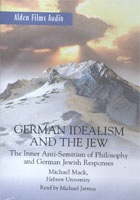
German Idealism and the Jew; The Inner Anti-Semitism of Philosophy and German Jewish Responses 2009
Distributed by Alden Films, Box 449, Clarksburg, NJ 08510; 732.462.3522
Produced by Alden Films
Director n/a
Audio CD, 9 hr., 8 min.
College
Jewish Studies, Philosophy
Date Entered: 10/14/2009
Reviewed by Kenneth A. Smith, Valdosta State UniversityThis book explores anti-Semitic aspects of German Idealist thought and the response of German Jewish intellectuals to these discourses. The weight of the book leans heavily on Kant. This is appropriate because, beyond the Idealists, Mack is titling at the Enlightenment. In short, Mack views anti-Semitism as less a counter-enlightenment backlash, then a tendency smuggled into Enlightenment views of rationality itself.
The approach of this study is that of contemporary critical and literary theory. This is important, because scholars coming from other disciplines are likely to find themselves at odds with his methods. Early in the text, Mack addresses the objections of the historian. Does viewing Idealist Philosophy from the perspective of the Holocaust necessarily do injustice to the past? Mack’s response, unconvincing to anyone likely to make this objection, boils down to “since I’m critical, this is not likely to happen to a significant degree.” To his disavowal of passing judgment or ridiculing Kant, Hegel, or Wagner, one may respond that it is implicit in the text. One can trust the reader to do the rest.
A major problem with the study is its over ambitious range. Occasional litanies map out the vast areas of concern: The political, philosophical, theological, sociological, and literary critical ramification of anti-Semitism. The book discusses fourteen major thinkers in a mere 178 pages (to these 14, we could add an additional 3 which appear in the introductory chapter). Discussion is compressed, and would have benefited from greater exposition. The summary treatment of so many thinkers gives the impression that this is less a book on German Idealism and the Jew, then a set of notes towards one.
A final criticism concerns Mack’s writing style. At a time when so much scholarly writing is stilted and jargon-ridden, this criticism seems uncharitable. But this is a vice more easily tolerated in written than in audio presentations. When one is struggling to follow difficult ideas (presented with such compression), an egregious phrase can jolt the listener right out of the text. Not what, but how a thing is being said becomes the focus. At those times, you must hit the pause to compose yourself: My, what ridiculous prose!
The criticism raised above lead to the question, who is the audience for this audio recording? A general audience will find this work largely incomprehensible. A scholarly audience will want access to the footnotes. The production quality is very good. Reader Michael Jarmus is admirable as he negotiates this difficult text. I applaud Alden Films Audio for wishing to bring more challenging material to listeners of audiobooks. Unfortunately, this was not the text to bring.